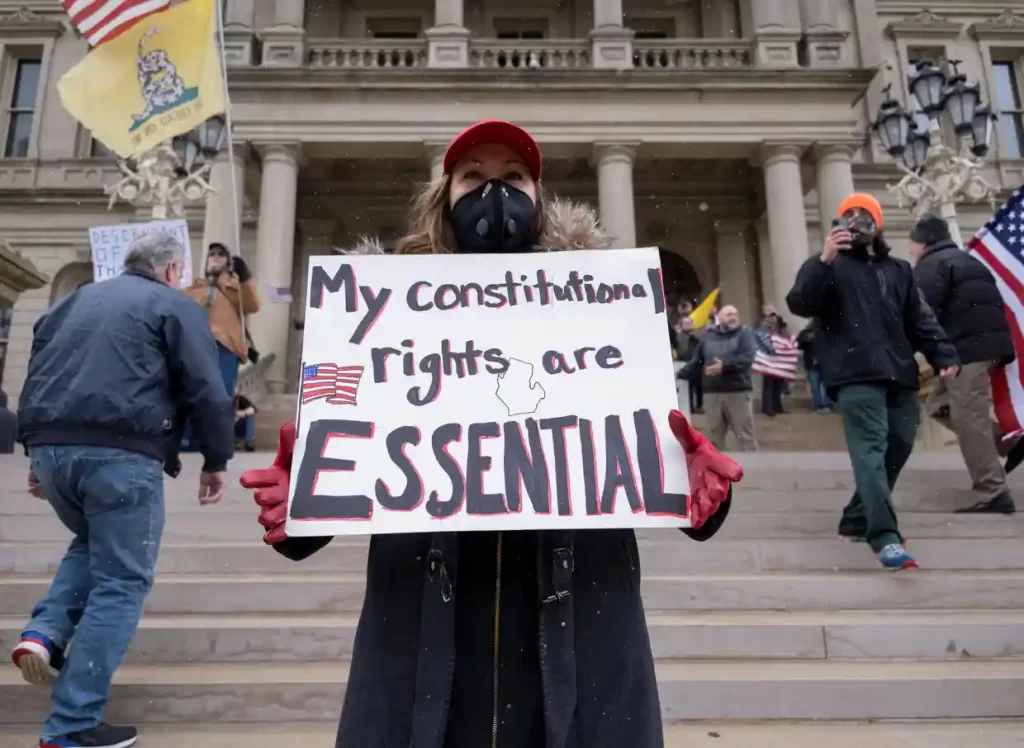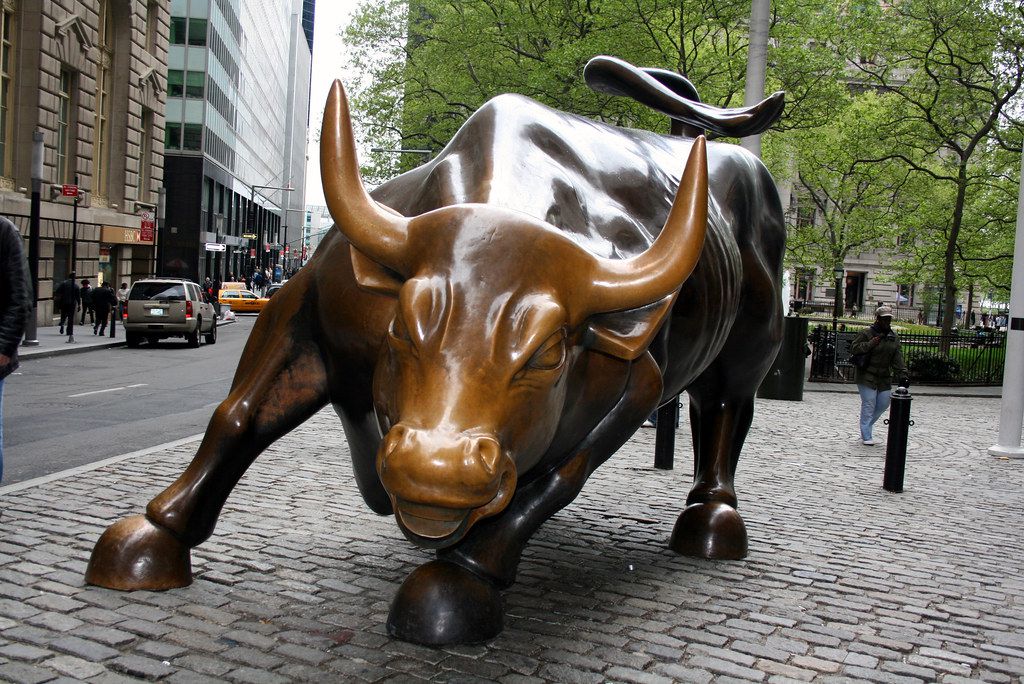The consequences of American political economy have reached their long-awaited climax. The majority of its inhabitants, left abandoned in the face of an anonymous power structure, have succumbed to widespread social inertia. For most this economic freak show and political mayhem are made intentionally incomprehensible, and so, with clarity abandoned, the much-needed questions and answers are left to drift in the forbidden void now classified as political discourse.
The trajectory taken by the collapsing empire is one that a few perceptible writers were documenting early. The 2008 global financial meltdown, the endless wars in the Middle-east, and the sine qua non when it comes to understanding America, 9/11, have manufactured mass insecurity. What is left that remains to be said as the world watches a failed social experiment continue on its charted course?
A Political Rock being Steadily Eroded
Beginning a diagnosis of the deep malaise afflicting the US is one that requires an exploration of the various aspects of its society and dominant culture, most notably, the imperial, racist, and mythological rhetoric many still cling to.
The contempt shown by the political class towards their constituents is indicative of the excesses of bourgeois democracy. Instead of representing the people, politicians in both the Republican and Democratic camps have resorted to Machiavellian and face-saving gestures as they continue to placate the corporations who own and control the political arena. The power of the endlessly touted constitution, now conjuring up images of a utopian man in a utopian society, once a political rock, is slowly becoming undone. The social actor as imagined by the constitution is one which simply no longer exists. The world as it is and people as they currently are when compared to the type of society as articulated in the constitution cannot help but produce friction.
This is due in no small part to how the economy is organised with figures such as James Maddison succinctly concluding that “The most common source of faction [class] has been the various and unequal distribution of property. Those who hold and those who are without property have ever formed distinct interests in society”. For Marx, these contradictions cannot help but play a forceful role that ultimately shapes the society they operate within, especially if they form the basis for how those societies are to be organised.
Liberalism: The Right to Selfishness
When commenting on the limitations of political emancipation in his early writings, Marx noted that it reduces man to an “egoistic and independent individual, on the other hand to a citizen, a moral person”.

If man cannot “take the abstract citizen back into himself” and in his work and relationships become “a species-being” emancipation will never be accomplished as this duality found in the unreality of the constitution and the reality of everyday life yields a contradiction. When commenting on the French Revolutionary Constitution of 1793, Marx observed that this gave man the right to “selfishness” and an individual mutual hostility as “the right of man to property is the right to…dispose of them arbitrarily without regard for other men” and this “leads man to see in other men not the realisation but the limitation of his freedom”.
Thus, liberalism is unable to produce real freedom, and this finds itself manifested most intensely in the United States as the constitution reproduces the same limitations Marx highlighted. With the economic affairs of the nation designated as the private arena of individuals who are entitled to pursue their aims at the expense of everyone else, Marx could see what effect this also had on societies where those who were labelled as being without access to the privileges that wealth and property afforded.
Marx’s Estranged Labour
In Estranged Labour, private property, Marx notes, is not explained to us even as Capital “starts with the fact of private property”.
Political economy, he continues “throws no light on the cause of the division between labour and capital…it takes for granted what it is supposed to explain”. With labour still unable “to comprehend these laws” the world itself and its processes appear almost illusory and fictitious. And thus, “the right of man to property.” and the right to “dispose of them arbitrarily” now means the right of human beings to dispose of one another.
This early humanism in Marx’s writings can be directly connected to chapters such as “The Working Day” in Capital and in other works such as Grundrisse where Marx elaborates further on how private property is the right to alienated labour. Though he began to formulate a more comprehensive worldview which involves the sacred triad of English political economy, German philosophy, and French Socialism, Marx still saw the need to fully emancipate humanity from the restrictions capitalism imposed in order that individuals could fully develop according to their own skills and talents.
As “political economy conceals the estrangement inherent in the nature of labour” few writers have investigated the effects this has had on a mass scale and how the psychological make-up of a society’s inhabitants can become distorted as a consequence.
In The Sane Society the social psychologist Erich Fromm starts with Marx’s insights into the estrangement of labour and from there explores its manifestation in various pathologies which he saw as detrimental to human development.
Fromm’s Sane Society
Fromm uses the concept of “abstractification” and “quantification” in order to provide meaning to the phenomenon he saw emerging within the US as the economic conditions there rapidly changed.
By re-defining our relationship to the world using concepts that are not an inherent part of it, such as the monetary value placed on everything, Fromm concluded that the citizens within the US struggled in their ability to relate to the world in meaningful ways. He elaborated on this by saying “This transformation of the concrete into the abstract has developed far beyond the balance sheet.
With the rise of market societies where human relations are determined and meaning is cultivated within economic environments, the world itself and the things we produce become more defined by the “logic” of those same processes. We “are experienced as exchange value”, just as we might comment on the “3-million-dollar bridge, a twenty-cent cigar, [and]a five-dollar watch”.
This reconfiguration of experience where the “usefulness” of things is replaced by abstract formulations ultimately for Fromm leads to the death of human qualities as it is slowly replaced by “formulas of economic function”. As capitalism offered a new freedom with the smashing of archaic social relations this “freedom from” was not fully replaced with a “freedom to” develop for a large portion of humanity.
The Financialisation of Capital
With a complete transformation of the economic foundations and of what goods were being produced and the value system used to assess the wealth being generated, we can see how Fromm’s ideas are more pertinent than ever.
The replacement of an industrial economy with one based on stocks, bonds, assets, and services was a move towards what Marx called “fictitious capital”. This change, which means value is generated almost out of thin air, has meant that the “abstractification” that Fromm discussed during the industrial Fordist methods of production was intensified as the animal spirits of the financial sector were let loose. Finance has little relation to the real world even though it has now come to dominate America.

The success of companies on Wall Street when compared to the catastrophic events surrounding it reinforces this unreality of the world. The “alien powers” which govern capital and the forces turning society now seem to be a mystery confronting its inhabitants. This has also given rise to the reality of the anonymity of power which now characterises American society and how it has become more difficult for those who wish to fight back for progressive reform to accurately pinpoint who/what their struggles should be aimed at.
In modern times it’s very easy to see how this phenomenon has given rise to the various conspiracies that try to fill in the gaps where terms like “they” or “elites” now compensate for concrete terms like “class”.
“It’s Not Hope, it’s Fantasy”
The writer Chris Hedges has written extensively on this American psychosis as the empire approaches its hegemonic twilight. Characteristic of societies that are on the decline and which have alienated the mass of the population is the triumph of compensatory illusions.
Optimism “becomes a disease…and if hope is something… expressed through illusion, it’s not hope, its fantasy”. Hedges documents what he sees as a society which has abandoned rational reality-based discourse about the nature of the world and its replacement by “magic” and “the spectacle” and that America “is now replicating the patterns that past civilisations in collapse underwent”.
With a thought process that mirrors Fromm’s “abstractification”, Hedges outlines a few examples in his book Empire of Illusion where popular culture within the United States itself expresses the country’s retreat from reality. The rise of positive psychology, worship of the free market, get rich quick financial gurus, cult-like patriarchal leaders, climate change denial, snake-oil salesman who hope to convince emasculated white men how they can project their “inner” alpha male energies in order to dominate women, and the ascension of religious and conspiracist thinking, are all symptoms of the “triumph of the spectacle” and fictional narratives about how the world actually works.
The narratives that reduce the world from seemingly overwhelming complexity into simple binaries such as good vs evil (or order and chaos in the case of Jordan Peterson) along with offering people a way to cope with life have begun to replace those same institutions that have abandoned many to prisons of their own despair.
Monetary insecurity, the shattering of human relations, the abstractification of the world, the celebrity culture of human aggrandisement, and the inability to offer its inhabitants a humanist way of living which provides them with democratic opportunities in the economic and political arenas has been the result of America’s capitalist system. Pointless work or the rise of ‘bullshit jobs’ as described by the late economic anthropologist David Graeber along with the millionaire political class who are owned by their financial backers is the ultimate expression of the rise of mass estrangement and the death of a human society.
This includes the rise of climates of hate as division and competition become a way of life. The totalitarianism inherent in capitalism has now come to define America and finds itself expressed in traditional religious movements as the “God-given American freedom to exploit other human beings to make money” allows corporations to act as if governed by a divine decree.
Wrestling Alone: The Collapse of National Confidence
In Empire of Illusion Hedges uses additional examples such as how common national interests like professional wrestling have moved from a mock-reality showpiece to a quasi-drama of sorts where the narratives each event spins reflect the anxieties particular to that generation.
During an interview he stated,
“if you look at the narratives within professional wrestling a few decades ago when my grandfather was watching it, it was built around xenophobia, a celebration of the blonde blue-eyed American hero fighting figures like the…red bear…foreigners who wanted to subvert the American way of life. And this has all changed”
Now we see within professional wrestling “no morality, everybody cheats, these back stories are…built around…the traumas that have been inflicted on the working class in the United States which has been thrust into a deep dislocation, a disenfranchisement with the destruction of the manufacturing base”. Crowds can be seen weeping at shows when wrestlers talk about financial loss, personal suffering, or any issue widespread in America today.

Wrestling has become a form of theatrical catharsis as spectators experience themselves vicariously through the figures who play these roles. With the triumph of illusion having been accomplished, it is no surprise to see a figure like Trump emerge from within those same conditions as he peddled his own conspiracist-based discourse that quickly resonated with millions who cheered on what appeared to be their saviour.
Trump’s ‘1776 Project’ reinforced that same history-as-fiction as several key events were left out of the original report which includes the inability to come to terms with the realities of being the world’s first apartheid state. The descent into illusions and fantasy can be seen here as the idea of “America” must be retained at all costs, even at the expense of others who become inconvenient reminders of a past and still very relevant history of racism and white supremacy.
No Private Road to Freedom
Having begun with Marx’s early analysis on the political/economic contradictions inherent within certain States we can see those same forces now having reached an extreme within the US.
The inability of its inhabitants to take “the abstract citizen back into [themselves]”, and subsequently in their work and relationships become “a species-being” has led to a breakdown of human relations and the rise of compensatory and necessary illusions in order that the State continue to function.
Marxism, writes the political scientist Michael Parenti, is not a “dogma” or “reductionist unscientific claims” but is rather a “social science…Marxism has an explanatory power that is superior to mainstream bourgeois social science because it deals with the imperatives of class power and political economy”.
Marxism does not attempt to develop abstractions when contemplating on the nature of human beings as it views human beings as intrinsic to and the agents of historical change. Speculation on the nature of human beings that is detached from their material conditions are no better than unsubstantiated theories or conjecture.
As Michael Parenti explains:
“Marx realized that what capitalism claims to be and what it actually is are two different things…Marxism might be considered a holistic science in that it recognises the links between various components of the social system” as they operate presently.
For the United States this is so as the various social forces, both economic and political, have led to the outcomes we see today. The individual citizen within the United States is not free in reality, the illusion of freedom is maintained by experiencing those fantasies through a fictional narrative which is expressed through the constitution and the nature of class society where power is held by a minority who control the dominant institutions.
The inhabitants within America are a far cry from any notions one might receive about the actors in the constitution.
In Grundrisse Marx challenges the notion of freedom that is ascribed to “the market” as some concrete entity whose purpose is authentic liberty:
“Although free competition has abolished the obstacles created by the relationships and means of pre-capitalist production…It is not individuals but capital that establishes itself freely in free competition”.
The domination of capital and the subordination of human beings to it means that it is not human beings and their development that are the aim of capitalist production, but profit. Everything else is secondary.
In Socialism and Humanism, the socialist theoretician George Novack elaborates on Marx’s point as “Anyone who hopes to find a private road to freedom is deluded”. In order for materialism to triumph and for the conditions “that require illusions”, as Marx stated, to end, it requires that human beings be able to express their freedom and have mastery over their destiny as mediated through the activity of their lives. Novack again points to a caveat as:
“Freedom is one of those very general social categories that can be easily empty of definite categories unless it is related to concrete circumstances…The ordinary man and woman does not think of freedom in this historical and sociological manner. They approach it in a more individualistic way” but “personal freedom is a function of the social system as a whole and cannot transcend the state of collective freedom”.
Without a material collective freedom this again “leads man to see in other men not the realisation but the limitation of his freedom”. Marxism “places human beings in the very centre of the historical process-and is thereby humanistic…human beings have produced their own history” and can produce their own freedom.
If the inhabitants within the United States cannot abandon their illusions, it will only lead to a further mass estrangement and degradation of society. The need for a society to provide a meaningful existence for its inhabitants that can address the complex issues that define human experience and our place in the world can only be done if those societies work for people not for abstractions.
Capitalism cannot offer those things. Instead it gives them and America illusions.

